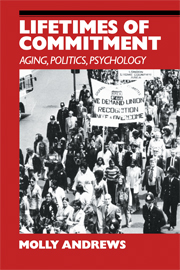Book contents
- Frontmatter
- Contents
- Acknowledgements
- 1 Defying the stereotype
- 2 The potential of social identity theory
- 3 On the subject of subjectivity
- 4 Personal stories
- 5 A nation in turmoil: Britain between the wars
- 6 Radicalization: coming to commitment
- 7 Political conviction and the social self
- 8 Growing into socialism
- Conclusion: aging and sustained purpose
- Notes
- Bibliography
- Index
6 - Radicalization: coming to commitment
Published online by Cambridge University Press: 23 September 2009
- Frontmatter
- Contents
- Acknowledgements
- 1 Defying the stereotype
- 2 The potential of social identity theory
- 3 On the subject of subjectivity
- 4 Personal stories
- 5 A nation in turmoil: Britain between the wars
- 6 Radicalization: coming to commitment
- 7 Political conviction and the social self
- 8 Growing into socialism
- Conclusion: aging and sustained purpose
- Notes
- Bibliography
- Index
Summary
there is always a honeymoon period in life, when you fall in love… with the job that is really worth your life. Nothing can take the place of that period. That is the moment, and ought to be, and is.
Trevor Huddleston (Caradon et al. 1967: 59)It is hoped that the previous pages have instilled in the reader an awareness of the political urgency which characterized the inter-war years. Haunted by the aftermath of the Great War, reeling from the consequences of an economic crisis of unprecedented dimensions, Britain appeared ripe for political change. The more desperately wrong things seemed to be, the more people believed in the possibility of a fundamental restructuring of society. As documented in the previous chapter, both the left and right saw in this time a great, perhaps unique, potential for the realization of their respective visions of society. The result was mass political education and participation. But how did this grand scenario translate into the daily lives of ordinary people? In this chapter we shall explore how and why the respondents of this study came to their political convictions.
In Chapter 3, I argued that retrospective data was most useful in indicating to the researcher what, over time, has remained or become important to the respondent regarding the way in which he or she has come to understand his or her life story.
- Type
- Chapter
- Information
- Lifetimes of CommitmentAgeing, Politics, Psychology, pp. 112 - 140Publisher: Cambridge University PressPrint publication year: 1991



